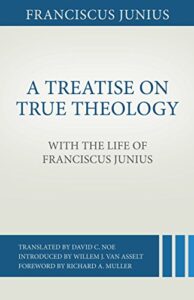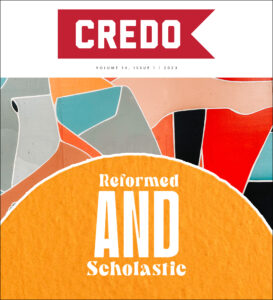P rolegomena and post-Reformation theology is, perhaps, the tag-team champion of neglected topics in theology. If a systematic theology has a chapter on prolegomena, it is often skipped by those who rush straight to more concrete doctrines like theology proper or bibliology. Seminary students are often whisked from the death of John Calvin to the 20th century (with a short pit stop in the Great Awakening). If you were me in undergrad and seminary, you are the Platonic form of both these neglections.
rolegomena and post-Reformation theology is, perhaps, the tag-team champion of neglected topics in theology. If a systematic theology has a chapter on prolegomena, it is often skipped by those who rush straight to more concrete doctrines like theology proper or bibliology. Seminary students are often whisked from the death of John Calvin to the 20th century (with a short pit stop in the Great Awakening). If you were me in undergrad and seminary, you are the Platonic form of both these neglections.
Yet, prolegomena and the period of the post-Reformation are crucial to the task of theology. Theological disagreements are often not merely a matter of how certain doctrines are constructed or how certain passages are considered, but tied to something as foundational as differing views of knowledge. Questions like “What can we know” and “how can we know it” are at the center of theological inquiry, and the post-Reformation provides for us a volume of Reformed prolegomena that impacted generations of theologians.
In 2014, David C. Noe, now Emeritus Professor of Classics at Calvin University, translated Franciscus Junius’s influential work of Reformed prolegomena, A Treatise on True Theology. In this new edition of True Theology, readers are presented with a compilation of three documents. First is an introductory essay to Junius’s life and place among post-Reformation thought by the esteemed, late historian Willem van Asselt. Then, Noe provides a translation of Junius’s autobiography, The Life of Franciscus Junius. The real prize of the volume, though, is Noe’s translation of True Theology, a challenging and crucial contribution to Reformed theology that has been reintroduced to the English-speaking world.
Biography and Summary
Junius was born in 1545 in Bourges, France. He was one of nine children and the son of a local nobleman. Junius studied law at Bourges and Lyon and theology at Geneva under John Calvin and Theodore Beza during Calvin’s final years (1562–1565). Junius was a true pastor-theologian, pastoring churches in France and Germany as well as holding professorships in Hebrew and Theology at multiple universities. Junius died while serving as Professor of Theology at Leiden University in the Netherlands in October of 1602; a victim of an outbreak of the Bubonic Plague.
As a scholar, Junius co-published a new Latin translation of the Old Testament together with Immanuel Tremellius, a Jew converted to Protestantism. Junius and Tremellius’s Sacra Biblica was published together with Theodore Beza’s Latin translation of the New Testament and was widely influential even into the 18th century. Junius’s scholarly interests were diverse. He wrote commentaries on the Pentateuch, several Old Testament prophets, and Revelation, arguments related to Hebrew grammar and exegesis, works of political theology, polemical works against Catholics, and works of early federal theology, just to name a few. So respected was Junius as a scholar that the King of France asked him to be an advisor regarding Protestant affairs. Famously, beginning in 1592, Junius carried out cordial correspondence with Jacob Arminius – who would replace Junius at Leiden University in 1603, allegedly against Junius’s wishes – over their disagreements regarding predestination and God’s decrees. These correspondences were published posthumously in 1613 as Amica Collatio cum Francisco Junio.
Junius’s distinction between archetypal and ectypal theology becomes ubiquitous in Reformed theology. Click To Tweet In his introductory essay, Asselt provides a biographical sketch of Junius that provides more narrative clarity than the included autobiography and a summary of the major contributions True Theology provides for Reformed Theology. Crucially, Asselt ends his introduction with a discussion of the wide impact True Theology had on both Lutheran and Reformed theology. Junius’s distinction between archetypal and ectypal theology becomes ubiquitous in Reformed theology and is utilized by Amandus Polanus, Peter van Mastricht, Francis Turretin, Johannes Cocceius, Johann Heinrich Heidegger, John Owen, Jacobus Arminius, Herman Bavinck, Abraham Kuyper, and Karl Barth. Given this pedigree, it is amazing that it has taken so long to get a new edition of Junius’s work. Van Asselt’s introduction is a valuable essay on post-Reformation history and theology.
The volume also includes Junius’s autobiography, titled, The Life of the Noble and Learned Franciscus Junius, Doctor of Sacred Theology and Distinguished Professor at Leiden University. This autobiography reads more like a spiritual biography than a detailed recounting of his life and activities. Junius lived during a dangerous time in European history. The continent was under political and religious tumult that resulted from the Protestant Reformation. Junius’s early life was marked by a mob killing his father, and several of Junius’s inter-country moves were his attempt to flee persecution. In a tender moment at the end of this work, Junius reflects on his four marriages and nine children. His first three wives died due to complications from childbearing. Six of his nine children did not see adulthood. Yet, despite these unimaginable tragedies, Junius presents himself as a pilgrim, keenly attuned to his duty to love and serve Jesus and the Church.
The final and most important component of this volume is A Treatise on True Theology, a masterful exposition of Reformed prolegomena. In 39 theses, Junius answers the question, “What is theology?” From this central question arises many claims, including the difference between true and false theology, man’s knowledge of theology, the efficient and instrumental cause of man’s theology, and the teleological end of theology. Readers will notice a dramatic shift in readability between van Asselt’s introduction, Junius’s autobiography, and True Theology. The latter requires careful reading as Junius plunges headfirst into epistemological considerations.
Evaluation
The highlight of the volume is Junius’s distinction between archetypal and ectypal theology. This distinction, as previously mentioned, became standard in Reformed theology well beyond the early post-Reformation. Junius reaches back to medieval scholastics and the Church Fathers to critically appropriate important categories of knowledge. Archetypal theology, Junius argued, is God’s perfect knowledge of Himself. It is, analogically, “divine wisdom of divine matters” (107). It is God’s “eternal and essential wisdom,” and because of God’s simplicity, it is God’s essence itself (110). Only God has archetypal theology; the capacity to understand Himself in his limitless perfection. Ectypal theology, on the other hand, is wisdom concerning the divine and fashioned from archetypal theology. This knowledge is accommodated from God’s knowledge of Himself and given to creatures. Thus, God is the efficient cause of ectypal theology, and its final cause, as ectypal theology exists to glorify God.
Why is this distinction between archetypal and ectypal theology important? It highlights the metaphysical gulf between God’s perfect knowledge and creaturely knowledge. It is not merely that creaturely knowledge is not as complete as God’s knowledge, it is that God’s knowledge is of a wholly other kind. It is its own genus. The fact that God “graciously reveals” our theology to us fosters a spirit of humility and thankfulness as we set our eyes on God. “In theology,” Junius writes, “we rise up to the loftiness of heavenly and divine matters, and fix the whole gaze of our minds on that end with utmost zeal” (232).
There are also Christological ramifications to Junius’s categories. Famously, the German Reformation contained a contentious division between Martin Luther and Ulrich Zwingli over the nature of the Lord’s Supper and the Christological implications of each view. From this context, Junius argues contrary to Lutheran scholastics that in Jesus Christ archetypal and ectypal theology meet. However, human nature cannot contain archetypal knowledge because that knowledge is a perfection of God and is incommunicable. Junius maintains with the Reformed that the union of natures “does not bring about either a confusion or a transfusion of the properties that pertain to the one nature or the other” (122). He concludes, “Whoever does not think that the knowledge of Christ as a man should be distinguished from the knowledge of that same one as God, such men for sure, though unawares, will slip little by little into the camp of Apollinaris” (123). Junius’s distinction between archetypal and ectypal theology in Christ helped establish how Reformed theologians from then until now treat the communication idiomatum. Junius’s distinction between archetypal and ectypal theology in Christ helped establish how Reformed theologians from then until now treat the communication idiomatum. Click To Tweet
Finally, it is worth noting that True Theology contributes to the ever-crumbling image of Reformed scholastics as brains-in-vats devoid of devotion. To be sure, True Theology requires slow, careful readings – especially for those unaccustomed to detailed, technical arguments of the scholastics. However, for Junius – and other scholastics – theology is an exercise in wisdom and cannot be divorced from devotion. Consider Junius’s full remarks regarding the theological humility that the archetypal/ectypal distinction invokes, referenced earlier:
For because our theology, which indeed can be present in us, is a tiny bit of that theology which God expresses perfectly in His Scriptures—since in fact it has been revealed in the Scriptures as the symbol and mystery of the wisdom that we shall obtain in heaven by the vision of God face to face—certainly it cannot but happen that, the more we are carried along in the whole course of this our miserable life, the more we feel our own ignorance and weakness. May this weakness of ours so disgust us that with true humility, which occupies the first and most important place in theology, we rise up to the loftiness of heavenly and divine matters, and fix the whole gaze of our minds on that end with utmost zeal (232).
Junius invites us, through the careful study of God, to worship. This worship may not be as easily engaged as a sung hymn or prayer offered with bowed head, but it is an act of worship worth pursuing.
Beyond Calvin
All three items contained in this volume – van Asselt’s introduction, Junius’s autobiography, and True Theology – serve to shine a light on a portion of Church History worth recovering. Reformation Theology did not end with the death of John Calvin. Franciscus Junius was a critical contributor to early post-Reformation Theology, who influenced his peers and generations of theologians. Any modern student of theology would benefit from sitting at his feet and learning about the nature of our learning about God.


